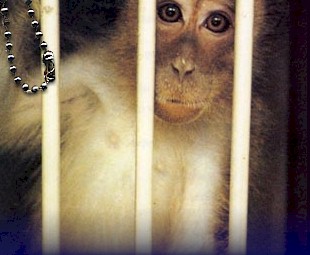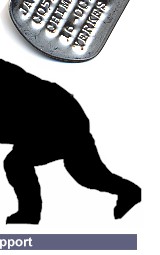






|
||||||||||||||||||||||||||||||||||||||||||||||||||||||||||||||||||||||||||||||||||||||||||||||||||||||||||||||||||||||||||||||||||||||||||||||||||||||||||||||||||||||||||||||||||||||||||||||||||||||||||||||||||||||||||||||||||||||||||||||||||||||||||||||||||||||||||||||||||||||||||||||||||||||||||||||||||||||||||||||||||||||||||||||||||||||||||||||||||||||||||
The Life of Prisoner r80180
from the files of the Wisconsin Regional Primate Research
Center (WRPRC) r80180 is a Rhesus Macaque, Macaca mulatta, a species found
in the wild from Afghanistan east to China and Vietnam. She was
born on Dec. 31, 1980 at WRPRC and was still alive as of March 8,
2002, the last entry date in her historical records provided by
WRPRC. Thus, she has been imprisoned for all of her 21+ years of
life! Apparently, r80180 was conceived a female but was made a hermaphrodite
by being injected with androgenizing hormones prenatally. When referring
to r80180, I will use female pronouns. During r80180's first 9+ years at WRPRC, she was used primarily
as a source of blood although for what purpose is unclear. Also,
she was weighed almost monthly probably as an indicator of general
well being. In June 1988, she tested positive for B virus but negative
for SRV-1, SRV-2, SIV, CMV, EBV, and measles viruses. Subsequently,
she tested negative for B virus in Oct. 1989. From 1989 through Nov. 1992, vivisectors continued to draw blood
regularly, apparently to test for tuberculosis. The anesthetic,
ketamine, was also given intramuscularly each time TB testing was
done. In late 1992, r80180 was part of a study titled "Ovarian Dysfunction
in Female Rhesus Monkeys." Blood was drawn frequently and general anesthesia (usually ketamine)
was injected approximately 21 times over the next five and a half
years in preparation either for ultrasound examinations (probably
of her internal reproductive organs), TB testing, an MRI, or DXA
scan. Also during this time frame, she received a laparotomy - a
surgical incision in the abdominal wall - and was examined, probably
her ovaries, with an optical device called a laparoscope. Probing of r80180's reproductive organs continued from July 1997
through mid-1999 when she was made part of yet another research
project titled "Endometriosis MRI Scanning." More ketamine,
blood draws and another laparotomy followed as a result. Also, two
more TB tests, including one of her right eye, were made. Whether
or not r80180 had endometriosis - inflammation of the uterine lining
- is unclear from WRPRC's records. However, a physical exam revealed
the presence of a firm mass in her posterior abdomen." In August 1999, she was made a test subject in a project named
"DNA Profiling of Primates Used in Biomedical Research."
At this time a physical exam revealed a mid-abdominal mass in addition
to the caudal abdominal mass found earlier. The exam also showed
that she had kyphosis - an abnormal outward curvature of the spine
creating a humpback appearance. There is no rest for a primate at WRPRC. From October 1999 through
the end of January 2000, r80180 was put in a study called "Oocyte
Competency in Prenatally Androgenized Monkeys." Records reveal
that in November, she suffered from diarrhea for about 11 days.
A rectal culture and stool sample were collected and showed none
of the common pathogenic bacteria but the presence of three parasitic
species -trichomonas, amoeba, and entamobea coli. Apparently the
diarrhea was treated successfully with antibiotics. During the oocyte
study she was given approximately 23 doses of human FSH (follicle
stimulating hormone) recombinant and one dose of HCG (human chorionic
gonadotropin) recombinant probably to stimulate her ovaries to develop
eggs and to stimulate the lining of the uterus. Numerous blood draws
and a diagnostic ultrasound of her abdomen and lower body wall were
also made. In January 2000, she was given her third laparotomy,
this time apparently to remove eggs from her ovaries. Vivisectors at WRPRC never seem to draw enough blood from their
primate victims, so once again r80180 was a donor as part of a project
called "Clinical Blood or Surgery" from February 2000
through August 2000. During this time she tested negative for four
different viruses, but the kyphosis remained and she demonstrated
reduced range of motion in her hips and stifles as well. She also suffered from another bout of diarrhea for at least two
days and there appeared to be no change in the sizes of her mid-abdominal
and posterior abdominal masses detected in 1999. Starting in July 2001, r80180 was used in two projects, one called
"Andronized Female Rhesus as Model for PCOS" (sic)
and the other, "Ovarian Dysfunction in Female Rhesus Monkeys,"
the same project for which she had been used in 1992. For the latter
project, she was again injected with more HCG recombinant. A physical
exam during this time detected a possible endometriosis type adhesion.
For some reason her hand and foot were x-rayed and she had CAT and
DEXA scans, all while under general anesthesia. In December 2001,
records show that she was accidentally dosed with a drug called
azithromycin (zithromax), but the effects, if any, were not logged.
[Note: PCOS, or Polycystic ovarian syndrome, is a fairly common condition occurring in approximately 5%-10% of the adult female poulation. It is associated with infrequent and irregular menstruation commencing at puberty. The National Library of Medicine has over 4000 scientific papers related to PCOS cataloged on line; fewer than 10 are based on data from monkeys, suggesting that the value of such work has been generally acknowedlged to be insignificant. PFP.]
Aside from the usual regimen of blood draws, the last notation
in r80180's record notes that she continued to display lumbar kyphosis
and decreased range of motion in hips and stifles, but now also
had mild enlargement of her liver. Could all those doses of ketamine
be the reason? During her 21+ years of experimentation at the hands of the vivisectors
at WRPRC, records show that r80180 had blood drawn approximately
191 times and was anesthetized with ketamine or some
other general anesthetic approximately 45 times through
3/8/2002. One does not have to have a medical degree to predict
the health effects of so much anesthetic. Biomedical researchers try to convince us that knowledge gained
from animal studies can be extrapolated to humans yet their scientific
papers reporting the results of research repeatedly include a disclaimer
warning about making such an assumption. Yet, vivisectors at WRPRC
want us to believe that the pathology of organ dysfunction in non-human
primates is the same as those in humans. Actually, the best they
can say is that research on primates is applicable to primates.
For much of r80180's life she has been used for research investigating
primate reproductive function. Would you go to a veterinarian if
you had problems with your reproductive organs? Certainly not! Animal "models" of human disease are erroneous because
of the cellular and biochemical differences among different species.
The best way to study diseases of humans is to conduct noninvasive
and painless research on humans. This can be accomplished by a variety
of methods. For example, increasing the number of human autopsies,
which due to higher costs are undertaken less frequently than in
the past. Virtually every disease has either been discovered or
clarified by autopsies. Technological advances in the biological
and physical sciences like CAT, MRI, and PET scans have yet to have
their full potentials tapped. Conducting epidemiological studies
of human populations using high-speed computers has identified all
known environmental poisons and occupational hazards. Clinical
research - observing and analyzing patients' conditions - has
always been a vital component of medical investigations. Examples
of diseases treated successfully as a result of clinical studies
are innumerable. Post-marketing drug surveillance is yet
another non-animal method. This is a system of reporting all of
the effects and side effects of a medication after it has been released
to the public. Health practitioners could detect and prevent the
dangers associated with negative drug reactions. Many other effective
non-animal methods are available in addition to these. In addition, animal species routinely used in research have the
capacity to feel pain, to enjoy pleasure, to think and act purposefully,
and to prepare for future events. In short, they have degrees of
self-awareness and lives that are important to them beyond any utilitarian
purposes they may have for humans. To incarcerate them and subject
them to painful research, even if such research may afford some
benefit to humans, is unethical and immoral. If we are willing to
subject animals to pain and agony in and attempt to improve our
health, then what we lose in return, our compassion and empathy,
is far greater. How many more primate victims like r80180 must be sacrificed before
we say 'enough'? Actually, we are already past that point! This accounting of r80180's life was written by Bob Tintle. Mr. Tintle wrote to WRPRC for r80180's records and brought his story to light. The Primate Freedom Project is thankful that Mr. Tintle and other concerned citizens are gathering information about the primates imprisoned in the nation's labs and calling attention to their misery. Such stories underline the fact that suffering-filled lives are the norm within these institutions. Speak out. Your silence signals your acceptance.
Home Page | Our Mission | News |